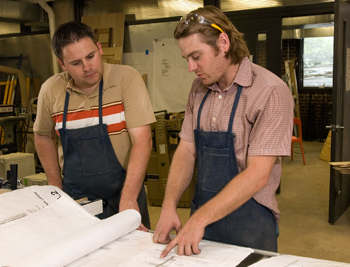|
Education, however, is only part of the university's presence in Northern Virginia. In fiscal year (FY) 2007, for instance, NCR reported $15.6 million in sponsored research. The region's outreach program provided noncredit educational services to 1,681 individuals (an increase of 54 percent from FY 2006) and returned $32,500 to Virginia Tech colleges and departments (a 21 percent increase). Still growing, the NCR now spans six locations in Northern Virginia: Alexandria, Arlington, Falls Church, Leesburg, Manassas, and Middleburg.
"We are dedicated to promoting all three of the university's missions," says Jim Bohland, vice president and executive director of the NCR. "Our goal is to encourage residents to access the range of educational, research, and outreach capabilities that an institution of Virginia Tech's caliber can provide."
|
|
|
|
|

Research centers and faculty in the NCR provide a window through which the vast array of scientific and technical expertise on the Blacksburg campus is more accessible to interested parties in the Washington, D.C., area.
|
|
|
Through the years
Having outgrown the farmhouse by 1973, Tech's Northern Virginia graduate center moved to the first floor of the Dulles International Airport Gateway 1 building. Eight years later, Virginia Tech joined the University of Virginia at Telestar Court in Falls Church, and about 30 minutes away, Tech established a presence in Old Town Alexandria by opening the Washington Alexandria Architecture Center (WAAC).
In 1990, WAAC moved into its current location at 1001 Prince Street, and in 2003, Virginia Tech added a second building at 1021 Prince Street, home to both the Metropolitan Institute at Virginia Tech and several graduate programs. In 1997, Virginia Tech and the University of Virginia dedicated the Northern Virginia Center (NVC), a 105,000-square-foot, state-of-the-art graduate center located adjacent to the West Falls Church Metro station.
Graduate students in the NCR often take advantage of opportunities to partner with the community. During the past eight years, a joint initiative of the Alexandria Small Business Development Center and the Pamplin College of Business has successfully teamed entrepreneurs with MBA students to tackle business issues such as operations strategy and competitiveness, quality concepts, product and service design, process planning and technology, facility location and layout, forecasting, capacity planning, inventory management, project management, and marketing strategies. Each partnership lasts 10 to 12 weeks within a normal semester and partially fulfills an M.B.A. course requirement.
Also located in Old Town Alexandria are the NCR operations administrative offices, which include Outreach Program Development. Outreach builds relationships and links the university's expertise and resources to tailor a wide variety of noncredit, customized, or contract educational programs and services that meet the diverse professional and lifelong learning needs of individuals, corporations, governments, and nonprofit organizations.
Meeting Tech's missions
At other NCR locations, faculty and staff contribute significantly to carrying out the university's missions in the region.
In Arlington, Virginia Tech's Advanced Research Institute--formerly the Alexandria Research Institute--not only provides a platform for the university's engineering and computer science researchers to interact with their counterparts in academia, government, and industry around the NCR but also serves as a gateway to the research and development base in Blacksburg.
Since 1972, the Occoquan Watershed Monitoring Laboratory in Manassas has made determinations in a number of areas critical to the ongoing management of water quality. The basin encompasses six political subdivisions, including portions of four counties and the entirety of two independent cities.
At the Marion duPont Scott Equine Medical Center in Leesburg, faculty conduct basic and applied research programs focused on translational research to improve animal and human health. Opened in 1984, the center is one of the three campuses of the Virginia-Maryland Regional College of Veterinary Medicine (the others are College Park, Md., and Blacksburg) and serves as one of the college's teaching hospitals, admitting 2,600 horses each year.
A 420-acre farm, the Middleburg Agricultural Research and Extension Center, was donated with a supporting grant to Virginia Tech in 1949 by the late Paul Mellon and his wife. For 40 years, the center was mainly used to conduct beef cattle research, but in 1992, it was rededicated to equine research.
"Research centers and faculty in the NCR provide a window through which the vast array of scientific and technical expertise on the Blacksburg campus is more accessible to interested parties in the Washington, D.C., area," says Bohland. "We aggressively partner and collaborate with universities, industry, governments, nonprofits, and research organizations to expand our presence in the region." Such partnerships and collaborations exist with the City of Alexandria, Arlington County, Georgetown University, Lockheed Martin, the Metropolitan Council of Governments, the National Defense University, and the CNA Corporation, among others.
|
|
|
|
 |
|
 A joint initiative of the Alexandria Small Business Development Center and the Pamplin College of Business has successfully teamed entrepreneurs with MBA students to tackle business issues. A joint initiative of the Alexandria Small Business Development Center and the Pamplin College of Business has successfully teamed entrepreneurs with MBA students to tackle business issues. |
|
|
|
|
|
NCR on the horizon
A new, major research facility is planned in the NCR. "Currently, we have a site identified," President Charles W. Steger said recently, "and the review process has begun." All programs in the new facility will have research faculty in residence and will be linked to faculty expertise in Blacksburg.
While the facility will house a range of research programs, Steger said that "there will be a focus on technology, particularly computational technologies and network systems."
Plans for the new research facility also include a "Science Showcase," a place for displays from federal science organizations and major science and technology corporations that will help bring science and technology to both the public and the scientific community.
"The National Capital Region, with its expanding graduate education and outreach programs, along with research opportunities, is an important factor in the university's growth," says Michael Anzilotti, a member of Virginia Tech's Board of Visitors who works and resides in the NCR. "Being so close geographically to organizations such as the National Institutes of Health is a great asset as Virginia Tech fosters growth in the region."
 Barbara Micale is the public relations and marketing manager for the NCR. Barbara Micale is the public relations and marketing manager for the NCR.
|

